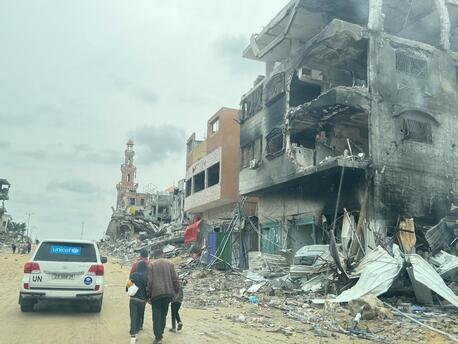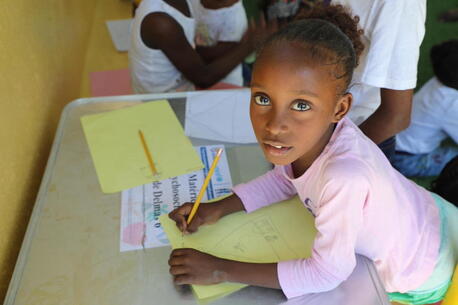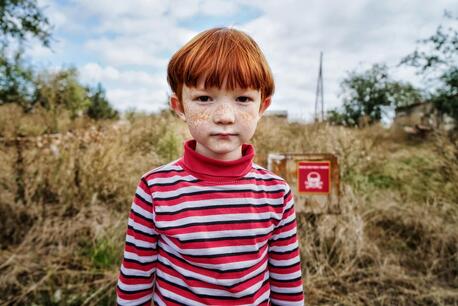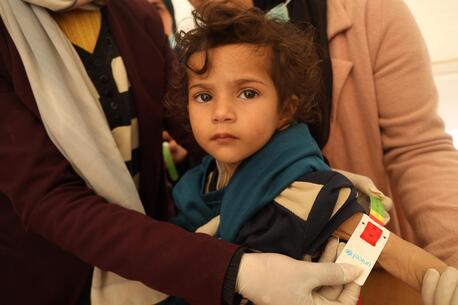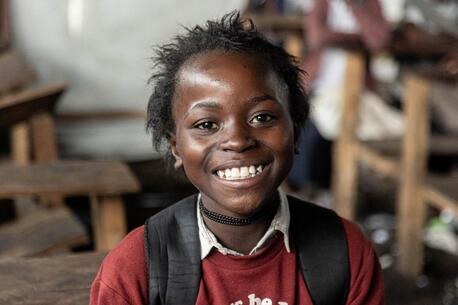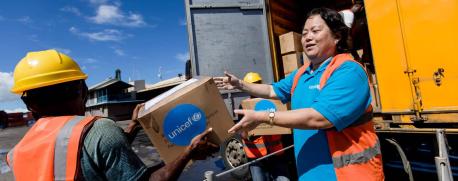
Emergency Response
UNICEF, a global leader in humanitarian relief, responds to hundreds of emergencies every year — delivering lifesaving relief, safeguarding children's rights and protecting them from harm.
How UNICEF helps children in emergencies
There have been an unprecedented number of humanitarian emergencies unfolding around the world.
Violence in Gaza and Israel. Catastrophic floods in Libya and Pakistan. Devastating earthquakes in Morocco and Afghanistan, a hurricane in Mexico.
Armed conflicts, extreme weather, public health crises and other shocks are threatening more of the world's children than ever before.
Children who live in a conflict or disaster zone are more likely to be living in poverty. They are more vulnerable to malnutrition and disease. And they are more likely to be out of school.
UNICEF, a global leader in humanitarian relief, responds to hundreds of emergencies every year — delivering lifesaving relief, safeguarding children's rights and protecting them from harm.
Rapid response teams often focus on providing safe water, health care and hygiene kits, nutrition and psychosocial support; identifying children who have become separated from caregivers and reuniting them; and establishing Child-Friendly Spaces.
UNICEF also supports recovery and rebuilding, working with governments and communities to strengthen emergency preparedness and increase resilience to future shocks.
UNICEF emergency relief efforts worldwide
Below, a look at a few specific emergency situations and crises where UNICEF is making a difference for children:
Child refugee and migrant crisis
A record number of children are displaced worldwide today, forced to flee their homes by armed conflict or gang violence, persecution, extreme poverty, hunger, drought and other threats to their health and safety. UNICEF acts to defend the rights of all vulnerable children on the move and to protect their futures — wherever they are, regardless of citizenship and at every step of their journey.
Climate crisis
UNICEF is responding to the climate crisis in three important ways: working to protect the health, safety, learning and opportunities of children, by adapting the critical social services they rely on and making them more resilient to immediate and expected climate impacts; by preparing children and young people to live in a climate-changed world, by improving their capacities to adapt; and calling on leaders and decision-makers to prioritize youth in climate funding and resources.
Earthquakes
When a powerful earthquake hits, endangering lives and devastating communities, UNICEF will rush emergency supplies to meet urgent needs of affected children and families and otherwise support government-led earthquake relief efforts. UNICEF has helped rebuild communities post-quake for decades, including in Haiti, Mexico and the Philippines.
Extreme weather disasters
When vulnerable communities are threatened by extreme weather — which is happening more and more, all around the world, as a result of climate change — UNICEF is among the first on the ground, often prepositioning supplies and joining local efforts to support and protect displaced children and families.
After coastal towns in northeastern Libya were swamped by Storm Daniel, UNICEF teams began immediate distribution of emergency supplies to those in harm's way. When the 2022 monsoon season left one-third of Pakistan underwater and more than 3 million children in urgent need of humanitarian aid, UNICEF quickly scaled up lifesaving humanitarian assistance for affected families in four provinces, leading response efforts in the areas of water, sanitation and hygiene (WASH), nutrition, child protection and education.
Food crises
UNICEF and partners are responding to food crises, including rising rates of child wasting in the Sahel as well as the malnutrition crisis in the Horn of Africa — the result of widespread, extreme food insecurity brought on by severe drought (exacerbated by climate change) and compounded by rising food prices.
Emergency relief measures include providing safe water, identifying and treating severely malnourished children with Ready-to-Use Therapeutic Food (RUTF) and dispatching mobile health and nutrition teams to areas with the greatest needs, among other lifesaving interventions.
Gaza and Israel conflict
The humanitarian situation for children in Gaza and Israel is dire, with over 1 million children affected. UNICEF is calling for a ceasefire, the release of all hostages and safe, sustained access to urgently needed supplies and assistance.
UNICEF and partners are working to deliver lifesaving aid to hundreds of thousands of children who remain trapped in a war zone with little or no access to food, water, electricity, medicine or medical care after deadly attacks in Israel gave way to devastating retaliatory air strikes in Gaza. Learn more.
Syria crisis
Prolonged civil conflict, a collapsed economy and the COVID-19 pandemic continues to fuel a humanitarian emergency in Syria. Millions of children are in need of humanitarian aid and protection inside the country and in refugee camps and host countries. UNICEF supports needs in health, nutrition, education and child protection, addressing urgent as well as long-term needs.
Ukraine war
UNICEF is meeting urgent needs of children and families impacted by war in Ukraine in a number of ways: providing safe water, nutrition, health care and psychosocial support, helping children access education and strengthening child protection inside the country and in refugee-hosting countries.
Yemen crisis
Years of conflict and economic shocks and food insecurity have left millions of children in Yemen in desperate circumstances. UNICEF teams are on the ground screening and treating children for malnutrition; immunizing children to fight disease; improving access to safe water, sanitation and hygiene and strengthening child protection, among other emergency interventions.
How UNICEF leverages existing partnerships to mobilize a rapid response
UNICEF is on the ground before, during and after emergencies strike, working to respond quickly and reach individuals who are most in need. With program offices in 157 countries, 7 regional offices and global headquarters in eight cities, UNICEF taps into existing partnerships and systems to mobilize a rapid and efficient response when disaster strikes, reaching even the hardest-to-reach children and families.
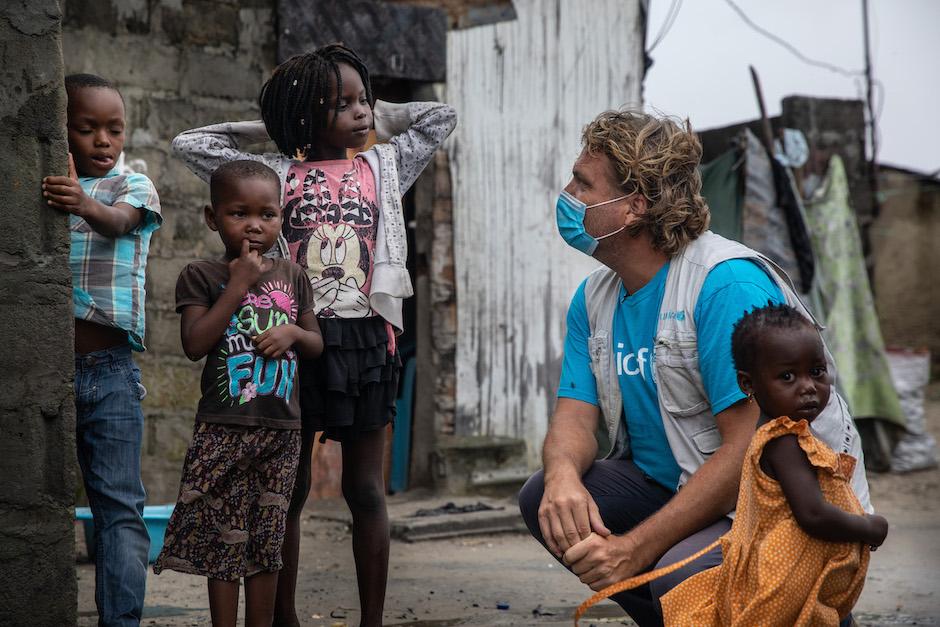
Top photo: Supplies are loaded onto a tourist boat for delivery to children and families on Fiji’s northern island of Vanua Levu who were impacted by Tropical Cyclone Yasa. UNICEF works with governments, civil society, NGOs and local partners to speed delivery of urgently needed supplies in the wake of natural disasters and other emergencies. © UNICEF/UN0384349/Stephen/Infinity Images

